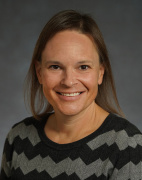Teacher Diversity and Student Success: Why Racial Representation Matters in the Classroom
Speaker
Dr. Seth Gershenson, Dr. Michael Hansen, Dr. Constance LindsayDate & time
Location
Dr. Gershenson, Dr. Hansen, and Dr. Lindsay address the historic and contemporary factors that have kept people of color out of teaching, synthesize the research showing the benefits of same-race teacher exposure, and argue that policies focused on improving teacher quality should take race explicitly into consideration. In their book, Teacher Diversity and Student Success: Why Racial Representation Matters in the Classroom, they present nuanced policy recommendations to increase teacher diversity in classrooms and promote more inclusive schools.
Free and open to the public.
Sponsored by Education Policy Initiative, Ford School, Center for Racial Justice and School of Education
About the speakers
Dr. Seth Gershenson is a Professor of Public Policy at American University. He holds a PhD from Michigan State University in Economics with a primary focus on education policy. While at Michigan State, he taught several courses and received an Outstanding Teaching award. Professor Gershenson has also been honored with the New Scholar Award by the American Education Finance Association. His approach to teaching and scholarship is to apply economic approaches to practical, policy-driven questions in public education, specifically teacher behavior. Professor Gershenson teaches Quantitative Methods, Managerial Economics, and Economics for Policy Analysis to MPA and MPP students.
Dr. Michael Hansen holds the Herman and George R. Brown Chair in Governance Studies and is a Senior Fellow in the Brown Center on Education Policy at the Brookings Institution. A labor economist by training, he has conducted original research on a wide array of education policy issues, with a specialization in teacher policy and school accountability. He has conducted original research on teacher diversity, teacher quality, student access to quality teaching, and STEM learning. Findings from Dr. Hansen’s research has received media coverage from prominent outlets including the New York Times, the Washington Post, the Atlantic, the Wall Street Journal, the Economist, Politico, and Education Week. His work has also been published in peer-reviewed research journals including American Economic Review, Education Finance and Policy, Economica, Educational Evaluation and Policy Analysis, American Educational Research Journal, among others. He is also editor for the Brown Center Chalkboard, the Brookings Institution’s blog on domestic education policy and research. Dr. Hansen is an Eisenhower Fellow (2020 Zhi-Xing China program) and holds a Ph.D. in Economics from the University of Washington.
Dr. Constance Lindsay is an Assistant Professor in the School of Education at the University of North Carolina at Chapel Hill. She earned a doctorate in human development and social policy from Northwestern University, where she was an Institute of Education Sciences’ predoctoral fellow. Since leaving Northwestern, Lindsay has worked in education policy in various contexts, applying her research training in traditional studies and in creating and evaluating new systems and policies regarding teachers. Lindsay’s areas of expertise include teacher quality and diversity, analyzing and closing racial achievement gaps, and adolescent development. Her work has been published in such journals as Educational Evaluation and Policy Analysis and Social Science Research. Lindsay received a bachelor’s degree in economics from Duke University and master’s degree in public policy from Georgetown University. Before doctoral study at Northwestern, she was a Presidential Management Fellow at the US Department of Education. Dr. Lindsay’s research focuses on policies and practices to close racial achievement gaps in education. Currently, her main focus is on teacher diversity and how to obtain a high quality, diverse educator workforce.
